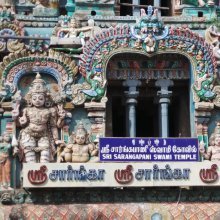Sharngapani, Śārṅgapāṇi, Sharnga-pani: 8 definitions
Introduction:
Sharngapani means something in Hinduism, Sanskrit, Jainism, Prakrit. If you want to know the exact meaning, history, etymology or English translation of this term then check out the descriptions on this page. Add your comment or reference to a book if you want to contribute to this summary article.
The Sanskrit term Śārṅgapāṇi can be transliterated into English as Sarngapani or Sharngapani, using the IAST transliteration scheme (?).
Images (photo gallery)
(+3 more images available)
In Hinduism
Vaishnavism (Vaishava dharma)
Source: Acta Orientalia vol. 74 (2013): Historical sequence of the Vaiṣṇava DivyadeśasŚārṅgapāṇi temple (or Bhāskarakṣetra) refers to Kuṭantai, one of the 108 Vaishnava Divya Desam (divyadeśas or divyasthalas), located in the topographical division of Cōḻanāṭu (“Chola country”), according to the 9th century Nālāyirativviyappirapantam (shortly Nālāyiram).—Tradition would record the Vaiṣṇava divyadeśas or divyasthalas are 108. The divyadeśa is a base of the cult of Viṣṇu in Viṣṇuism [Vaiṣṇavism] tradition. The list of 108 [viz., Śārṅgapāṇi] seems to have reached maturation by about the early 9th century CE as all the deśas are extolled in the hymns of the twelve Āḻvārs.

Vaishnava (वैष्णव, vaiṣṇava) or vaishnavism (vaiṣṇavism) represents a tradition of Hinduism worshipping Vishnu as the supreme Lord. Similar to the Shaktism and Shaivism traditions, Vaishnavism also developed as an individual movement, famous for its exposition of the dashavatara (‘ten avatars of Vishnu’).
In Jainism
General definition (in Jainism)
Source: WikiPedia: JainismŚārṅgapāṇi (शार्ङ्गपाणि) is another name for the nine Vāsudevas (or Viṣṇu, Nārāyaṇa), referring to a set of nine “heroes” and counterpart of the antagonistic Prativāsudevas (or Prativiṣṇus, Pratinārāyaṇas), mentioned in both Śvetāmbara and Digambara literature.—In every half time cycle, there are 9 sets of Balabhadras (gentle heroes), Vasudevas (violent heroes) and Prativāsudevas (anti-heroes). Unlike in the Hindu Puranas, the names Balabhadra and Narayana are not restricted to Balarama and Krishna in Jain Puranas. Instead they serve as names of two distinct classes of mighty half brothers, who appear nine times in each half of the time cycles of the Jain cosmology and jointly rule half the earth as half-chakravarti. Ultimately Pratinaryana is killed by Narayana for his unrighteousness and immorality.

Jainism is an Indian religion of Dharma whose doctrine revolves around harmlessness (ahimsa) towards every living being. The two major branches (Digambara and Svetambara) of Jainism stimulate self-control (or, shramana, ‘self-reliance’) and spiritual development through a path of peace for the soul to progess to the ultimate goal.
Languages of India and abroad
Sanskrit dictionary
Source: DDSA: The practical Sanskrit-English dictionaryŚārṅgapāṇi (शार्ङ्गपाणि).—m. epithets of Viṣṇu.
Derivable forms: śārṅgapāṇiḥ (शार्ङ्गपाणिः).
Śārṅgapāṇi is a Sanskrit compound consisting of the terms śārṅga and pāṇi (पाणि). See also (synonyms): śārṅgadhara, śārṅgabhṛt.
Source: Cologne Digital Sanskrit Dictionaries: Benfey Sanskrit-English DictionaryŚārṅgapāṇi (शार्ङ्गपाणि).—m. Viṣṇu, [Meghadūta, (ed. Gildemeister.)] 109.
Śārṅgapāṇi is a Sanskrit compound consisting of the terms śārṅga and pāṇi (पाणि).
Source: Cologne Digital Sanskrit Dictionaries: Aufrecht Catalogus Catalogorum1) Śārṅgapāṇi (शार्ङ्गपाणि) as mentioned in Aufrecht’s Catalogus Catalogorum:—father of Viṣṇu Sarvajna, who was a guru of Sāyaṇa. Oxf. 246^b.
2) Śārṅgapāṇi (शार्ङ्गपाणि):—son of Mukunda. See Sāraṅgapāṇi.
Source: Cologne Digital Sanskrit Dictionaries: Monier-Williams Sanskrit-English Dictionary1) Śārṅgapāṇi (शार्ङ्गपाणि):—[=śārṅga-pāṇi] [from śārṅga] m. ‘holding (the bow) Ś° in the hand’, Name of Viṣṇu-Kṛṣṇa, [Kāvya literature; Kathāsaritsāgara] etc.
2) [v.s. ...] of the father of Viṣṇu Sarva-jña (who was Sāyaṇa’s Guru), [Sarvadarśana-saṃgraha]
3) [v.s. ...] of a Vaiṣṇava, [Catalogue(s)]
[Sanskrit to German]
Sanskrit, also spelled संस्कृतम् (saṃskṛtam), is an ancient language of India commonly seen as the grandmother of the Indo-European language family (even English!). Closely allied with Prakrit and Pali, Sanskrit is more exhaustive in both grammar and terms and has the most extensive collection of literature in the world, greatly surpassing its sister-languages Greek and Latin.
Kannada-English dictionary
Source: Alar: Kannada-English corpusŚārṅgapāṇi (ಶಾರ್ಙ್ಗಪಾಣಿ):—[noun] = ಶಾರ್ಙ್ಗಧರ [sharngadhara].
Kannada is a Dravidian language (as opposed to the Indo-European language family) mainly spoken in the southwestern region of India.
See also (Relevant definitions)
Partial matches: Sharnga, Pani.
Starts with: Sharngapanistotra.
Full-text: Carankapani, Sharngapanistotra, Vishnu sarvajna, Sharngabhrit, Sharngadhara, Bhaskarakshetra, Vivahapatala, Kutantai, Triprishtha, Colanatu.
Relevant text
Search found 8 books and stories containing Sharngapani, Śārṅgapāṇi, Sharnga-pani, Śārṅga-pāṇi, Sarngapani, Sarnga-pani, Śarṅgapāṇi, Śarṅga-pāṇi; (plurals include: Sharngapanis, Śārṅgapāṇis, panis, pāṇis, Sarngapanis, Śarṅgapāṇis). You can also click to the full overview containing English textual excerpts. Below are direct links for the most relevant articles:
The history of Andhra country (1000 AD - 1500 AD) (by Yashoda Devi)
Part 11 - Samrnapanideva or Sarngapani (A.D. 1267) < [Chapter XIV - The Yadavas]
Part 5 - Sarngadhara II (A.D. 1253-1267) < [Chapter XIV - The Yadavas]
Part 12 - End of the Panugal Yadva dynasty < [Chapter XIV - The Yadavas]
Later Chola Temples (by S. R. Balasubrahmanyam)
Temples in Kumbakonam < [Chapter IV - Temples of Vikrama Chola’s Time]
Trishashti Shalaka Purusha Caritra (by Helen M. Johnson)
Part 5: Killing of Bāṇa < [Chapter VIII - The episode of Sāgaracandra]
Part 15: Vimala’s samavasaraṇa < [Chapter III - Vimalanāthacaritra]
Part 2: Garden Sports < [Chapter IX - Ariṣṭanemi’s sport, initiation, omniscience]
The Sarva-Darsana-Samgraha (by E. B. Cowell)
The Gautami Mahatmya (by G. P. Bhatt)
Bhagavad-gita Mahatmya (by N.A. Deshpande)





